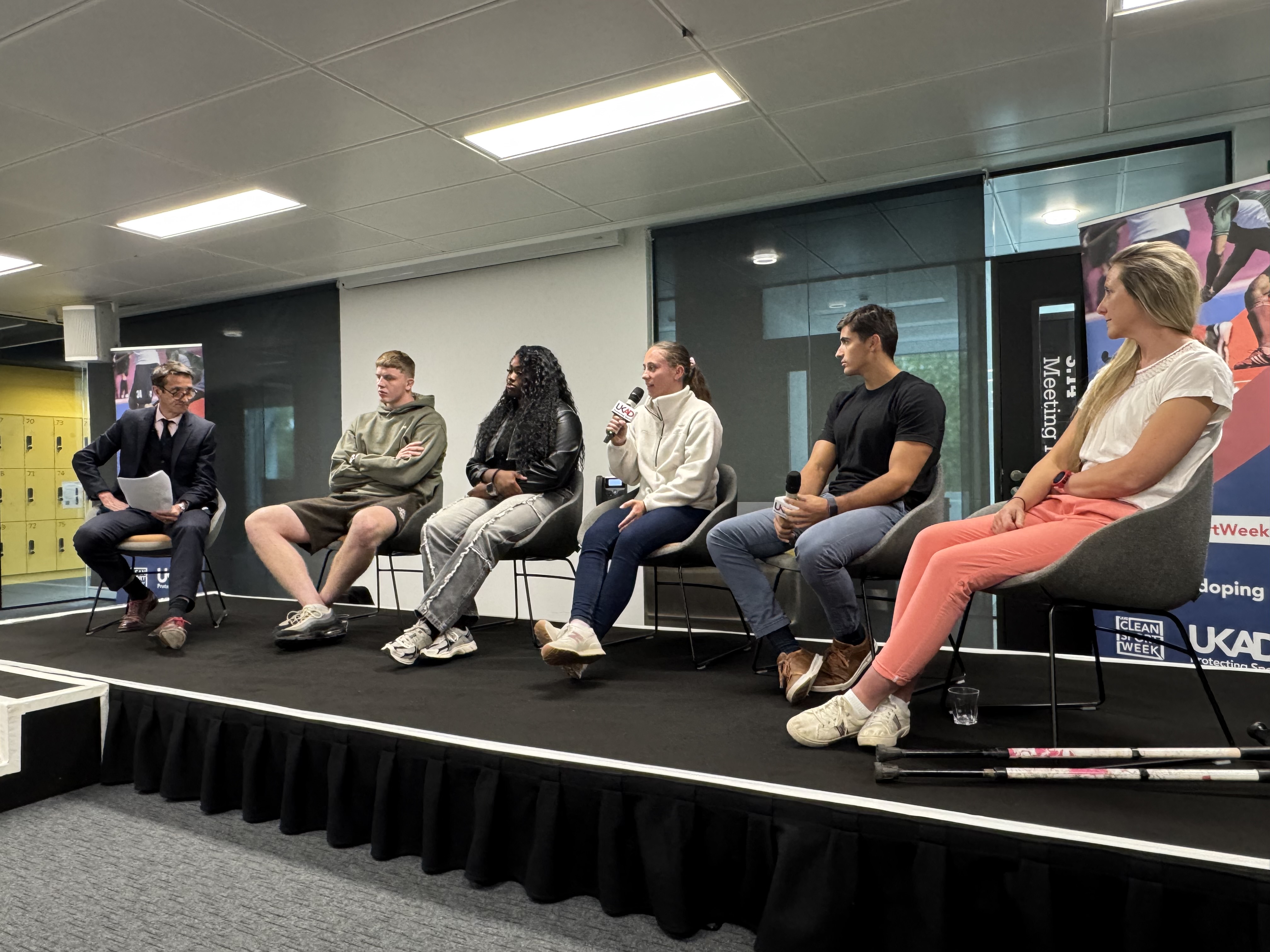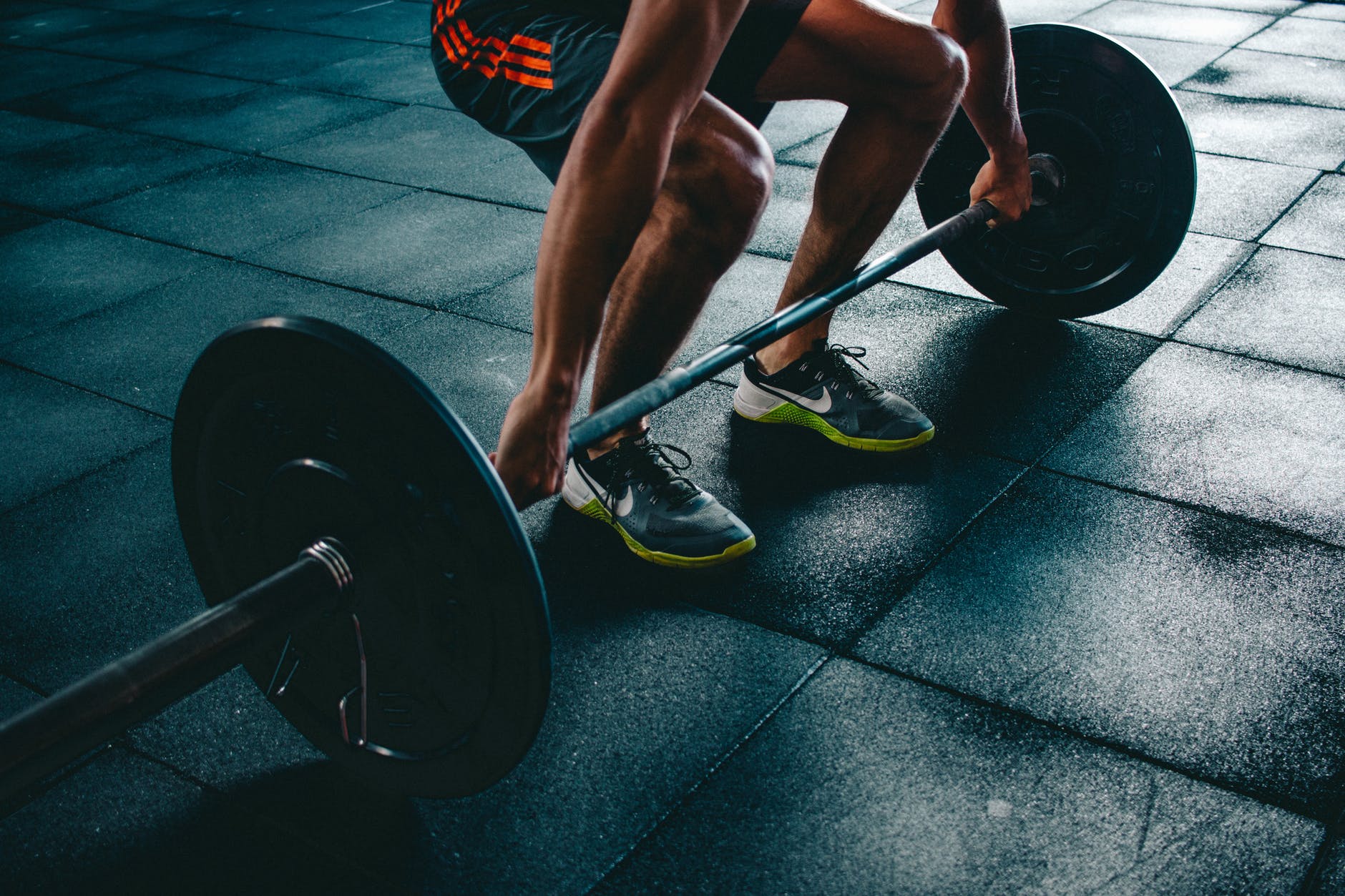Rising sporting stars open Clean Sport Week with compelling insights on the need for fair play

UK Anti-Doping (UKAD) hosted two panel events for the sporting community at Manchester Metropolitan University on Monday to kick off Clean Sport Week.
Presented by broadcaster Rob Walker, and consisting of athletes and industry experts, each panel discussed the unique pressure points young athletes face, as well as new survey findings released by UKAD on teenagers and their parents’ perception of doping in sport.
Rob summed up the mood in his introduction, underlining the need for clean sport and fair play: “The honesty of what we watch in sport is of paramount importance, you have to believe in and trust what you are seeing.”
Areas of concern for the first panel – made up of sporting stars – included social media pressures around body image, the intense demands of training, and the critical role of parents, coaches and peers in keeping athletes safe, happy and well.
Tom Burrow, Rugby union player aged 19, who has captained England at under-18’s and under-20’s level, discussed some of the pressures young athletes face online: “The influence of social media is horrendous with regards to image and what you might be tempted to buy to boost performance. Sport is great as it encourages us to be fit by being healthy and natural. It is important that sport provides us with clarity, so we can find the best version of ourselves.”
The panel all agreed that social media was a challenge to all young athletes.
Fay Henderson, double Scottish Women’s Curling champion and Annabel Amadin, Under 20’s UK Shotput, reflected on their similar experiences viewing the same advert on Instagram that was promoting a protein granola bar, containing prohibited substances – noting athletes have to be more careful than ever, and be aware of these risks.
Annabel who was in favour of getting education about anti-doping out to athletes early, said: “If you get the messaging out to young athletes it's more likely to stick in your brain.”
All agreed with this. Melissa Nicholls, UKAD Athlete Commission member and paratriathlete, added: “The earlier the education starts the better as you are then fair play focused.”
Fay also shared an interesting insight into what she felt were stronger expectations to be forgiven by a younger generation: “This expectation that by saying sorry they will be forgiven means they may not realise how important not doping is. They won't be ‘let off’ just because they say they didn’t realise and ‘please forgive me’!”
UKAD Athlete Commission Member Javier Bello, Beach volleyball star who alongside his twin brother was the winner of England’s first ever Volleyball Commonwealth Games medal in 2022, echoed the feelings of all when he emphasised how critical it is for the athlete to have strong support around them: “If we have the right people around us it keeps us safe. My coach is my Dad so he shows me how to play with integrity.”
The panel discussed the potential of an Enhanced Games, which the athletes agreed could legitimise doping and make the problem of access to illicit drugs online, worse. The risk to athletes far outweighs the entertainment factor promised by the Games organisers. UKAD’s survey findings show 2 in 3 parents (66%) said they would not watch, nor would they let their children watch the Enhanced Games. In addition, more than half (56%) of the teenagers surveyed said they would not watch it.
The closing section revealed insights on whether athletes who dope can ever be truly rehabilitated and forgiven. Tom Burrow felt, in a team sport like his own, it was about how they might behave on rejoining a team: “It’s less about the action and more about their reaction when they come back. The manner of how that player behaves in the dressing room, around the training ground and with their teammates – how they carry themselves and what they say, really matters.”
After the break, the second panel of industry experts reflected on the insights of the first panel and delved into the survey findings. Almost 3 in 5 (58%) teenagers surveyed said it would be ‘disappointing’ or ‘really concerning’ to hear about doping in elite sport. 22% of parents said that the possibility of doping makes them think twice about allowing their children to participate in elite sport.
Eve Muirhead OBE, who will be Chef de Mission for Team GB at the Milano Cortina 2026 Winter Games, highlighted how much of an important priority anti-doping education is to international-level athletes: “Education really is at the top of the list because anti-doping makes or breaks someone’s dreams.”
Dr Sasha Sutherland who is Executive Director of the Caribbean Regional Anti-Doping Organisation and responsible for anti-doping across the eighteen Caribbean nations, talked about athlete motivators in sport, noting the benefit of values-based education:
“Athletes know that their pride is pride in their community and their family and their nations. Regionally too it matters. So pride is not just self-interest, it’s much bigger. And this wider values-based approach can help keep athletes clean.”
Jane Rumble, UKAD Chief Executive, discussed the role of athlete support personnel, and the work UKAD has been doing to ensure athlete support personnel have access to high-level education to support their athletes: “UKAD recognises how important and influential athlete support personnel are to athletes, which is why we focus much resources and education for this group, including eLearning, which is free to access.”
Asked about his steroids research, Jim McVeigh, who has over 30 years’ experience of substance use research, recalled that many of the steroid users he speaks to, the majority of which play sport recreationally, seem to legitimise in their minds their reasons for taking steroids (for body image): “These bodybuilders, they’re not taking steroids for the primary reason of gaining an advantage in sport. But, when they realise that the steroids also improve their performance at the weekend [playing sports], that’s an added benefit for them, but they still don’t really see that as cheating.”
85% of teenagers surveyed in UKAD’s survey felt athletes caught taking Image and Performance Enhancing Drugs (IPEDs) should face a ban from sport. Kelly Sotherton, representing the British Elite Athletes Association, who herself has experienced the injustice of doping cheats, offered her opinion on when education should start for young people: “I’d like to see more focus on schools, particularly school sports day, as the opportune time to introduce anti-doping to young children”.
Trevor Pearce, the outgoing Chair of UKAD, concluded the event with a closing statement reflecting on his experiences with UKAD, summarising the challenges and broader integrity debate in sport and condemning the reckless idea of the Enhanced Games: “It is not bold, or brave. It is dangerous. It undermines the fundamental values of sport – fairness, health and integrity.”
Trevor added that sport is in good hands with the next generation of young people. UKAD’s survey findings show that clean sport and values of fair play still matter to the general public, and young people are clear about what is right and wrong in sport. Trevor thanked all the organisations and individuals who have supported UKAD on their journey.
Clean Sport Week continues until Friday 23 May. Follow @ukantidoping on social media to hear more of the stories and case studies from athletes and professionals on protecting and empowering the next generation of athletes in clean sport.



